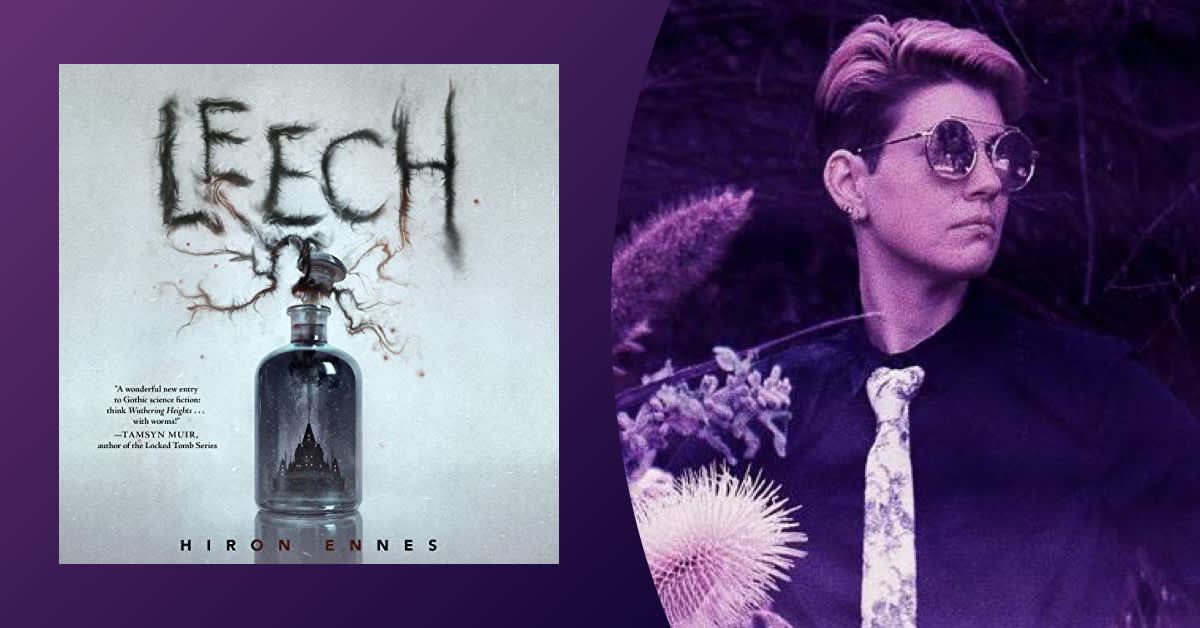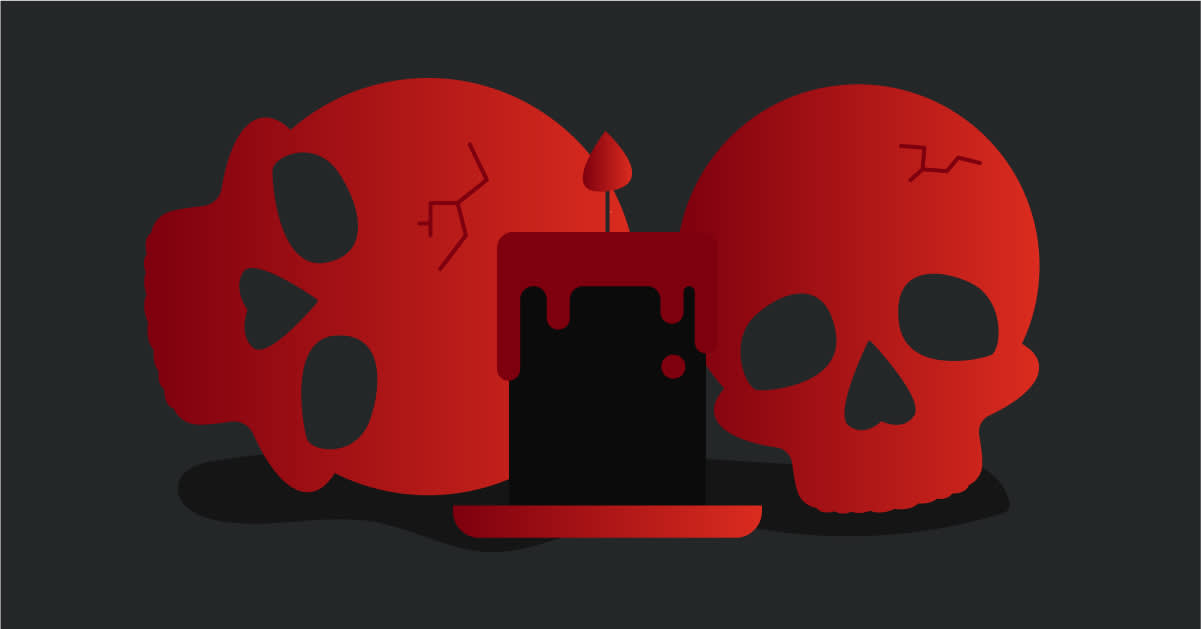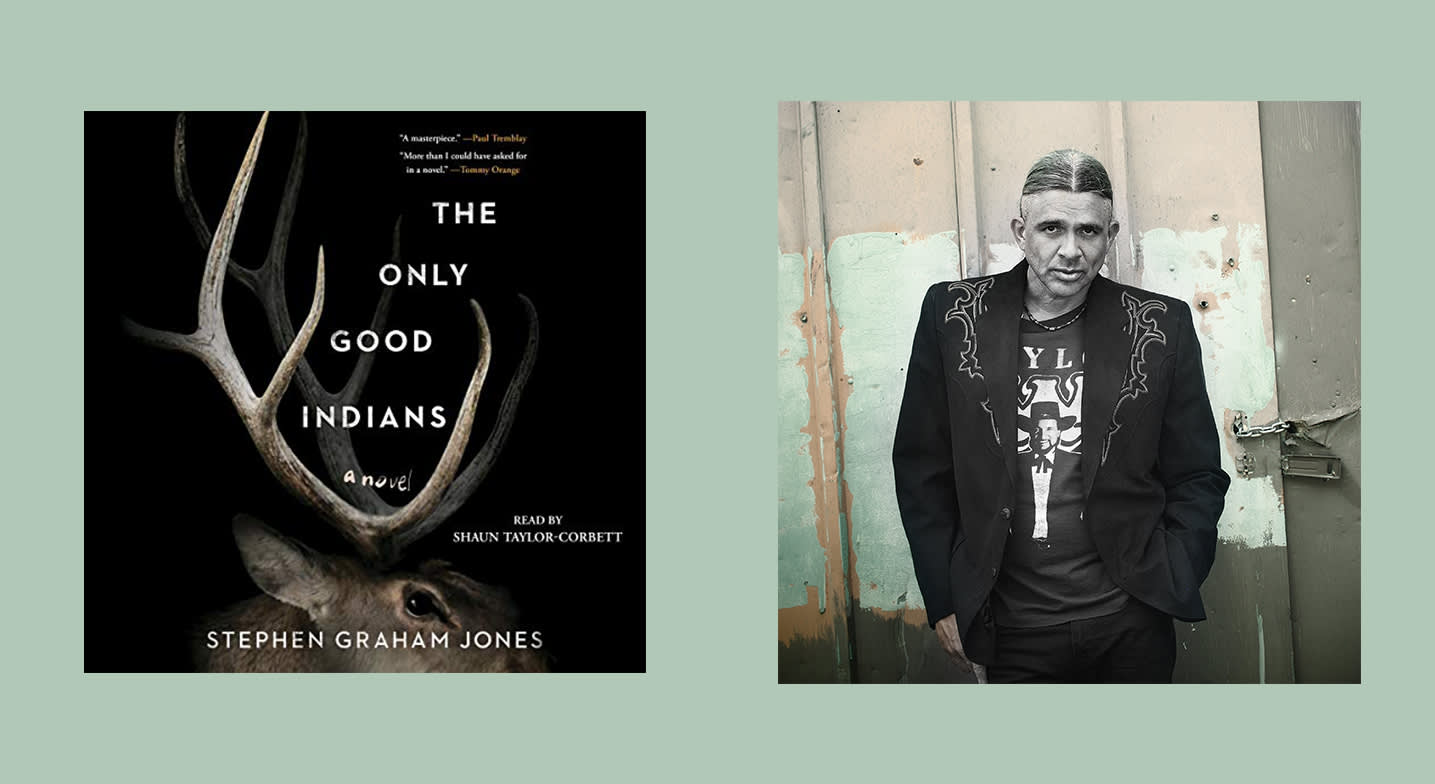Of the many horror titles released in the run-up to Halloween, none had me more excited (and terrified) than the debut novel of writer, musician, and medical student Hiron Ennes. A surreal, frightening Gothic listen with shades of Frankenstein and Wuthering Heights, promising a visceral plunge into our deep-seated fears of parasites and body invasion? Sign. Me. Up. Almost as thrilling as Leech itself, which stars the spooky narration of Abigail Thorn, Ennes graciously sat down to answer my many questions about their buzzy debut.
Audible: Congratulations on your debut novel! What does it feel like to publish this novel—did you always want to be a writer?
Hirron Ennes: I don't know if it was a matter of always wanting to be a writer but always being a writer. I have been attempting to write stories since before I could even write properly, and now that I can almost write properly, I can't seem to stop. It's an impulse, almost like breathing, and always has been. That said, being paid to write is something I never expected to happen, and honestly, I'm pretty stoked. Also terrified. Now that people are actually reading my stuff, I'm suffering from this weird, prolonged and distant kind of performance anxiety. Almost like I have, after all these years, forgotten how to breathe.
Leech is a wildly original story with a captivating Gothic setting and gorgeous prose, a delicious contrast with its revulsion-inducing medical descriptions, body horror, and chilling sci-fi premise. Can you talk about some of the influences behind Leech?
The narrative style of Leech was largely influenced by classic horror—Stoker, Shelley, et al. But the majority of the themes and medical science were influenced not by fiction but by the odd discoveries we've made about the microscopic world around us. Quorum sensing, or the emergent behavior of molds and bacteria, for example. How a cluster of mindless cells that would otherwise be easy to dismiss as primitive can achieve great feats of cellular architecture and function—or even band together to perform acts that resemble altruism. When I consider how the human body is basically that same collective on a more specialized scale, dependent on the billions of microbes that live on and inside it, it makes me question what it really means to call ourselves a single organism, or if the definition even matters. I find that both inspiring and existentially terrifying.
How do you think the Covid-19 pandemic affected the creation of Leech, whether in terms of ideas, themes, or the writing process?
To be honest, Covid-19 didn't really affect Leech. I wrote the majority of it in 2017, finished it in 2018, and it got picked up by an agent in 2019, so most of it was done before the pandemic. What Covid did do for Leech is get all the medical students kicked out of the hospital for a panicked month or so, which gave me time to polish it up for submission to publishers. That might not have been possible if I was intubating patients eight days a week like the residents were.
You have an interest in infectious diseases, pathology, and, presumably, parasites—among my favorite (and most feared!) horror tropes. What was your research like for Leech, and is there a particular infection or pathogen you’ve come across that scares you the most?
I don't think I did that much research specifically for Leech, since I kind of have a backlog of parasites living in my brain (figuratively—maybe literally, but I'm not checking). My favorites are always the ones that change host behavior, like guinea worms encouraging the host to immerse their feet in water, or toxoplasma subtly nudging you to acquire more cats. But if I'm going to be honest (and readers will see this very clearly in Leech), for me the scariest kind of parasitism is pregnancy. Hosting a growing fetus changes pretty much every organ system in the body, sometimes in mind-boggling ways. The physiologic demands of gestation and birth are miraculous and dangerous and utterly bizarre. There's a reason I'm not going into obstetrics. I'm too much of a coward.
“When I consider how the human body is basically that same collective on a more specialized scale, dependent on the billions of microbes that live on and inside it, it makes me question what it really means to call ourselves a single organism, or if the definition even matters.”
The audiobook of Leech is narrated by the British YouTuber and trans woman Abigail Thorn. Were you involved in her casting, and have you heard her performance?
As far as I remember, we got two auditions for the audiobook, and after discussing it with the team, we decided Abigail had the kind of classical cadence that might fit well with the Gothic feel of the book. Her performance is dynamic and theatrical, which is consistent with her other work.
Some of my favorite aspects—and the most surprising aspects—are so entwined with spoilers that it would almost be a disservice to say too much about them. All I can say is that it's truly fascinating to get a glimpse into how she, and by extension, other readers, might interpret the many ambiguities in the internal monologues. Some of her narrative shifts are truly lovely, and some of her dialogue opened up subtext I didn't even know I'd written. Twists in narration left me on the floor. It was a ride.
As far as characters, the baron, of course, is very fun, and I am so here for Abigail's almost frantic portrayal of Baker as a fluttering, hopeless bleeding heart (mon coeur—very Frenchie from The Boys). Didier was so surprising and so well done—he is so much more restrained than I expected, and I find that fascinating. The voice Abigail gives him makes me think there is much still tangled inside him, unexamined but ripe for prying apart. The man is due for a vivisection, I think.
Halloween is coming—what other books do you recommend for fans of Leech to try this season?
One great horror I loved recently is The Only Good Indians by Stephen Graham Jones. It's just so spooky and so artfully done—and it really tapped into my innate and inexplicable fear of elk (which also shows up in Leech). Also, Mordew by Alex Pheby. Not horror specifically, but it's Dickensian and Gormenghast-ic and very, very good. I pitch it as Oliver Twist for leftist Goths. It's long and a bit gory but so charming. I honestly can't wait for the second in the trilogy. On that note, check out the Ghormenghast series by Mervyn Peake. Don't wait until Halloween. Do it now.





